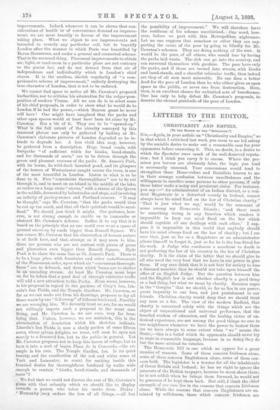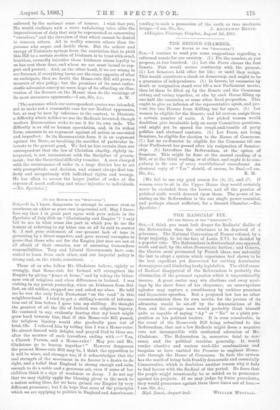LETTERS TO THE EDITOR.
CHRISTIANITY AND EMPIRE.
[To THE EDITOR OF THE " SPECTATOR.'] SIR,—Again, in your article on " Christianity and Empire," as in that which I criticised last week, you seem to me led astray by the amiable desire to make out a reasonable case for your• opponents before answering it. This, no doubt, is a desire to which the Spectator owes much of its well-deserved reputa- tion; but I think you carry it to excess. Where the pre- mises you borrow are obviously false, the logic you lend is necessarily unsound. Your concessions would tend to strengthen those Home-rulers and Socialists known to me in their strange confusion between unselfishness and the- willingness to sacrifice some persons to other persons, if only these latter make a noisy and persistent claim. For instance, you say :—" An administrator of an Indian district, or a resi- dent Magistrate in a disturbed county in Ireland, cannot always have his mind fixed on the law of Christian charity." That is just what we say,' would be the comment of some among my Home-rule friends ; and there must be something wrong in any function which renders it impossible to keep our mind fixed on the law which should regulate all our dealings with each other.' I sup- pose it is impossible in this world that anybody should have his mind always fixed on the law of charity ; but I am sure that, just so far as a Magistrate or an administrator allows himself to forget it, just so far he is the less fitted for his work. A Judge who condemns a murderer to death is not preferring the law of his country to the law of Christian charity. It is the claim of the latter that we should give to all who need the very best that we have in our power to give them. If any man think that it is not best for society to lose• a diseased member, then he should not take upon himself the office of an English Judge. But the question between him and the English law is not whether charity is a good thing or a bad thing, but what we mean by charity. Socrates urges in the " Gorgias " that we should, so far as lies in our power, grant impunity to our foes, and just punishment to our friends. Christian charity would deny that we should treat any man as a foe. The view of the modern Radical, that charity is concerned solely with the things which are the object of unquestioned and universal preference, that the hoarded wisdom of education, and the healing virtue of un- desired experience, are not among the good things we owe to our neighbours whenever we have the power to bestow them (as we have always to some extent when " we " means the State),—this is a belief which its opponents should never try to state in reasonable language, because in so doing they do but the more mislead its votaries.
The Home-rule Bill is one which we oppose for a great number of reasons. 'Some of them concern Irishmen alone, some of them concern Englishmen alone, some of them con- cern both. The legislator is a trustee for all the inhabitants of Great Britaln and Ireland; he has no right to ignore the interests of the British taxpayer, because he must share them; he is not selfish when he brings them forward, he would not be generous if he kept them back. But still, I think the chief strength of our case lies in the reasons that concern Irishmen alone. While the reasons that concern Englishmen are un- tainted by selfishness, those which concern Irishmen are enforced by the national sense of honour. I wish that you, Sir, would vindicate with a more unfaltering voice alike the imperativeness of duty that may be represented as concerning "ourselves," and the elevation of that which cannot be denied to concern others. All in reality concern others than the persons who argue and decide them. But the ardour and energy of Unionists springs from the conviction that to yield this Bill to a certain section of Irishmen is to treat with cruel, heartless, cowardly injustice those Irishmen whose loyalty to us has cost them dear, and whom we are most bound to sup- port and protect. And, on the other hand, if we are wrong in our forecast, if everything turns out the exact opposite of what we anticipate, then no doubt the Home-rule Bill will prove a measure of wise policy ; but the promises of its most enthu- siastic advocates convey no more hope of its affording an illus- tration of the Sermon on the Mount than do the warnings of its most strenuous opponents.—I am, Sir, &c., A. W.
The sentence which our correspondent quotes was intended, not to make oat a reasonable case for our Radical opponents, but, as may be seen by reference to the context, to illustrate a difficulty which neither we nor the Radicals invented, though modern Rousseauism seeks to use it for its own ends. The difficulty is as old as human speculation, and, in its widest form, amounts to an argument against all action as one-sided and imperfect. In its Rousseauistic form it is an argument against the State, as involving the sacrifice of particular in- terests to the general good. We feel no less certain than our correspondent that the law of Christian charity, rightly in- terpreted, is not inconsistent with the discipline of govern- ment ; but the theoretical difficulty remains. A man charged with the maintenance of order in a large district has to act with promptitude and decision, and cannot always deal ten- derly and scrupulously with individual rights and wrongs. He has often to secure the larger justice of order at the expense of much suffering and minor injustice to individuals. —ED. Spectator.]



































 Previous page
Previous page